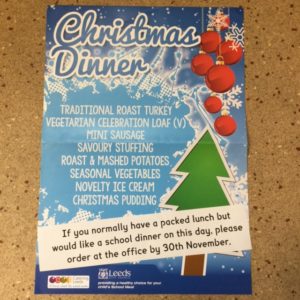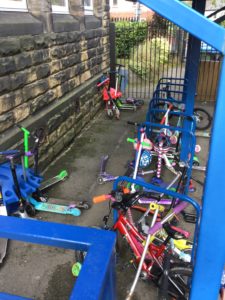Christmas dinner themed menu
Catering Leeds, our school meal provider, will be running a special Christmas themed menu on Thursday 15 December.
Please contact the office, by 30 November, if your child would like a school dinner on this day.
8 Rs for learning – our new SEAL theme
This half-term, we’re thinking about the ‘8 Rs for learning’. This theme is about promoting good learning behaviour for your child.
Each week, we’ll focus on different ‘Rs’. We use an animal to symbolise each ‘R’, which might help your child remember all eight – can your child remember which animal matches the correct ‘R’?
You can support your child at home – we’ve listed a few ideas to help you below. Ask us if you’ve any questions or comments.
Download top tips for promoting the 8Rs for good learning behaviour.
I take a safe risk.
Talk about the difference between a safe and unsafe risk. At school, we want your child to take a safe risk by having a go at answering, even if unsure; trying something new and attempting harder learning.
I take responsibility for my own learning.
Provide time and space at home so your child is able to organise themselves: their PE kit, reading book, homework, spellings and tables… Don’t organise everything for them!
Make a link between rights and responsibilities: your child has the right to a great education, but needs to be responsible for their own learning.
I respond to feedback.
Ask your child if they remember their ‘stars’ and ‘steps’ in English and Maths.
I can show I am ready to learn.
Make sure your child is at school for a prompt start of 08:50.
Make sure your child has had plenty of sleep so they are alert and ready to learn at all times.
Encourage your child to ask lots of questions – that shows they want to learn!
I am resourceful.
Encourage your child to be organised so they can play with a range of different toys.
Encourage your child to try new ways to solve a tricky problem.
I am resilient.
Encourage your child to keep going! Set a tricky challenge or puzzle for your child to do.
Encourage your child to think of different ways of doing things.
Don’t let your child win when they play a game – they need to experience losing, too!
Celebrate mistakes as opportunities to learn – be happy that your child found some learning hard and encourage them to ‘bounce back’ and learn from the experience.
I remember.
Make sure they have time to learn spellings, number bonds and times tables – a little practice daily is best.
Play memory games:
Kim’s game: show them objects for 30 seconds… can they remember all the objects?
Can they build up the sequence, ‘I went to the shop and I bought an apple’… ‘I went to the shop and I bought an apple and a bike.’… ‘I went to the shop and I bought an apple, a bike and a cucumber.’ etc … Take turns!
I reflect about my learning.
Talk with your child about what they’ve learnt, asking questions about:
how they learnt
why they learnt it
when they’ll use their learning
how they would teach this to someone else
what learning might link with what they’ve learnt today etc
Phonics
This week, we will begin Phase 2 of the Letters and Sounds phonics programme.
In this phase, children will continue practising what they have learned from Phase 1, including ‘sound-talk’ (orally blending and segmenting words). They will also be taught the phonemes (sounds) for a number of letters (graphemes), which phoneme is represented by which grapheme and that a phoneme can be represented by more than one letter, for example /ll/ as in b-e-ll. Your child might use pictures or hand movements to help them remember these.
Children will learn 19 letters of the alphabet and one sound for each. They will blend sounds together to make words and segment words into their separate sounds. They will begin to read simple captions.
The 19 phonemes are:
- set 1: s a t p
- set 2: i n m d
- set 3: g o c k
- set 4: ck e u r
- set 5: h b f/ff l/ll ss
VC and CVC words
C and V are abbreviations for ‘consonant’ and ‘vowel’. VC words are words consisting of a vowel then a consonant (e.g. am, at, it) and CVC words are words consisting of a consonant then a vowel then a consonant (e.g. cat, rug, sun). Words such as ‘tick’ and ‘bell’ also count as CVC words – although they have four letters, they have only three sounds. For example, in the word bell, b = consonant, e = vowel, ll = consonant.
In Phase 2, children will be seeing letters and words, as well as hearing them. They will be shown how to make whole words by pushing magnetic or wooden letters together to form little words, reading little words on the interactive whiteboard and breaking up words into individual sounds, which will help their spelling. These will be simple words made up of two phonemes, for example, ‘am’, ‘at’, ‘it’, or three phonemes, for example, ‘cat’, ‘rug’, ‘sun’, ‘tick’, ‘bell’.
Tricky words
Your child will also learn several tricky words: ‘the’, ‘to’, ‘I’, ‘go’, ‘no’.
Children will still be practising oral blending and segmenting skills daily. They need plenty of practice at doing this.
Bonfire Celebrations themed menu
Catering Agency, our school meal provider, will be running a special themed menu on Wednesday 02 November: Bonfire Celebrations. Please contact the office if your child would like a school dinner on this day.

School Saving Club
Does your child have a School Saving Club account in association with Leeds Credit Union?

If so, our next paying in date is this Thursday 13 October 3.15-3.45pm. If you can’t make this date, then the next one will be on Thursday 08 December at 3.15-3.45pm.
Children must be accompanied to the sessions.
If you can’t attend the date, you can bring money to the office in a sealed envelope marked School Saving Club for the attention of Miss Hale.
School Saving Club accounts can still be opened. Please ask at the office for an application form.
Children who are in Year 3 will have their account credited by Leeds City Council with £10 once opened.
Maths learning
This week the children have been learning to recognise, write and order numerals by finding missing numbers around school.
Scoot the Route
We’ve had a great response to the Scoot the Route scooter promotion this week with lots of names in the draw for one of our five prizes tomorrow. There is one more chance tomorrow.

We’d love to see the children continue to use their scooters, alongside walking and biking to school, to prevent congestion, improve safety and have a happy, healthy and active start to the day!
Yorkshire’s Rio Heroes
Welcome back Yorkshire’s Olympic and Paralympic athletes with a special homecoming parade! On Wednesday 28 September, a carnival atmosphere will take hold of Leeds as the athletes are welcomed home in true Yorkshire style.


A host of athletes have confirmed their attendance, including triathletes Alistair and Jonny Brownlee; World, European and Paralympic champion Hannah Cockroft, MBE; diver and gold medallist Jack Laugher; and rowers Andy Triggs Hodge and Paul Bennett who both claimed gold.
There will be a lively parade, with samba bands, brass bands, colourful performers and of course open top buses and vehicles carrying the athletes. Parade celebrations will start at 5.15pm, and we would love to see the people of Yorkshire come out in force to line the city centre route and cheer on these inspiring men and women.










